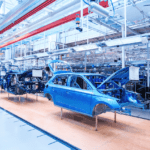

The Rise of the Luxury Car Market in Major Cities of Pakistan
One of the major factors contributing to the growth of the luxury car market in major cities of Pakistan is the increasing purchasing power of the affluent class. As the economy of the country continues to improve, more and more people are able to afford luxury cars as a symbol of their success and status. This has created a lucrative market for luxury car manufacturers and dealers.
In addition to the economic growth, changing lifestyles and preferences of the urban population have also played a significant role in the rise of luxury car sales. With the increase in disposable income, people are now more inclined towards indulging in luxury and comfort. Owning a luxury car has become a status symbol and a way to showcase one’s taste and style.
Furthermore, the development of infrastructure, particularly in major cities, has made luxury cars more practical and desirable. The construction of well-maintained roads and highways has made it easier for luxury car owners to navigate through the city and travel long distances in comfort. Additionally, the availability of luxury car service centers and dealerships has made it convenient for owners to maintain and service their vehicles.
Another factor driving the growth of the luxury car market is the increasing number of international brands entering the Pakistani market. Previously, the options for luxury cars in Pakistan were limited, with only a few brands available. However, in recent years, several international luxury car manufacturers have entered the market, offering a wider range of options to consumers. This has not only increased competition but has also made luxury cars more accessible to a larger segment of the population.
Moreover, the rise of social media and digital marketing has played a crucial role in creating awareness and generating interest in luxury cars. Influencers and celebrities often showcase their luxury cars on social media platforms, which has a significant impact on the aspirations and desires of the younger generation. The constant exposure to luxurious lifestyles through social media has fueled the desire for luxury cars among the urban population.
In conclusion, the luxury car market in major cities of Pakistan is experiencing significant growth due to various factors such as increasing purchasing power, changing lifestyles, improved infrastructure, the entry of international brands, and the influence of social media. As these factors continue to evolve, the luxury car market is expected to thrive in the coming years, catering to the growing demand of the affluent class in Pakistan.
Moreover, the changing lifestyle and aspirations of the Pakistani urban population have also contributed to the growing affluence in major cities. With the rise of social media and the influence of Western culture, there has been a shift in the mindset of individuals towards a more materialistic approach. People now want to be seen as successful and prosperous, and owning a luxury car has become a symbol of status and achievement.
Furthermore, the availability of easy financing options has made it more convenient for people to purchase luxury cars. Banks and financial institutions have introduced attractive loan packages with low interest rates, making it easier for individuals to fulfill their dreams of owning a luxury vehicle. This has led to an increase in the number of luxury car buyers, as people can now afford to pay in installments rather than making a lump sum payment.
In addition, the growing infrastructure and improved road networks in major cities have also contributed to the rise in the luxury car market. With better roads and highways, individuals are more inclined to invest in high-end vehicles that offer comfort, style, and performance. The improved transportation system has made it easier for people to commute and travel, further fueling the demand for luxury cars.
It is important to note that the growing affluence in Pakistani cities is not limited to luxury cars alone. The demand for luxury goods and services in various sectors, such as fashion, real estate, and hospitality, has also witnessed a significant increase. This reflects the changing consumer behavior and the desire for a luxurious lifestyle among the urban population.
In conclusion, the growing affluence in major cities of Pakistan, driven by factors such as increasing disposable income, changing lifestyle aspirations, easy financing options, improved infrastructure, and the desire for social status, has led to a surge in the luxury car market. As the economy continues to grow and urbanization accelerates, it is expected that the demand for luxury cars will continue to rise, making Pakistan an attractive market for luxury car manufacturers and dealers.
Moreover, the influence of social media and celebrity culture goes beyond just the desire for luxury cars. It has also shaped the way people perceive and value certain brands. In the past, consumers would rely on traditional advertising and word-of-mouth recommendations to make purchasing decisions. However, with the advent of social media, individuals now have direct access to the lives and opinions of their favorite celebrities and influencers.
For instance, if a popular Pakistani actor or actress is seen endorsing a particular brand of clothing or accessories on Instagram, their millions of followers are likely to be influenced by their choice. This has led to a significant increase in sales for these brands, as consumers believe that by purchasing the same products, they can achieve a similar level of status and success.
Furthermore, social media platforms have also provided a space for individuals to showcase their own lifestyles and possessions. Many Pakistanis, especially the younger generation, strive to curate their online presence in a way that aligns with the glamorous and aspirational images they see on their feeds. This has created a culture of consumerism, where individuals are constantly seeking validation and recognition through the acquisition of material possessions.
However, it is important to note that the influence of social media and celebrity culture is not limited to just materialistic desires. It has also played a role in shaping societal norms and values. For example, body image has become a major concern among young Pakistanis, as they compare themselves to the seemingly perfect and flawless bodies of their favorite celebrities. This has led to an increase in body shaming and an unhealthy obsession with appearance.
In conclusion, social media and celebrity culture have had a profound impact on consumer behavior in Pakistan. They have not only fueled the desire for luxury cars and branded products but have also influenced the way individuals perceive themselves and others. It is important for individuals to be aware of the potential negative effects of these influences and to prioritize their own mental and emotional well-being over societal expectations.
Luxury car brands have successfully positioned themselves as status symbols, catering to the desires of individuals who seek recognition and admiration from their peers. The allure of these brands lies not only in their exquisite craftsmanship and cutting-edge technology but also in the sense of exclusivity they provide. Owning a luxury car is not just about having a mode of transportation; it is about making a statement and projecting a certain image.
The role of brand perception cannot be understated in the luxury car market. Consumers are willing to pay a premium for a brand that is perceived as prestigious and high-end. The reputation and history of a brand play a significant role in shaping this perception. For example, Mercedes-Benz is renowned for its long-standing tradition of excellence and innovation, while BMW is associated with sportiness and performance. These brand associations influence consumer preferences and contribute to the overall appeal of luxury cars.
Moreover, luxury cars are often seen as a reflection of one’s social status and success. They serve as a tangible representation of wealth and achievement, conveying a sense of accomplishment to others. In a society where material possessions are often equated with success, owning a luxury car can elevate an individual’s social standing and enhance their perceived value.
The desire to be associated with luxury car brands goes beyond the product itself. It extends to the entire ownership experience, including the dealership environment, customer service, and brand events. Luxury car manufacturers understand the importance of creating a holistic experience that caters to the needs and expectations of their discerning clientele. From personalized concierge services to exclusive events and clubs, these brands go above and beyond to cultivate a sense of belonging and loyalty among their customers.
In conclusion, the role of brand perception and status symbol in the luxury car market cannot be overlooked. Luxury car brands have successfully positioned themselves as symbols of success and prestige, appealing to individuals who seek recognition and admiration. The perception of superior quality and the overall ownership experience further contribute to the popularity of luxury cars. As long as society values status and perception, luxury car brands will continue to thrive and hold a significant place in the market.
The Impact of Infrastructure Development
Another factor driving the growth of the luxury car market in major cities of Pakistan is the improvement in infrastructure. Over the years, there have been significant investments in road networks, highways, and bridges, making it more convenient for individuals to own and drive luxury cars.
Additionally, the development of gated communities and upscale residential areas has created a demand for luxury vehicles among the residents. These areas often have well-maintained roads and a higher concentration of affluent individuals, making it an ideal market for luxury car dealerships.
Furthermore, the improvement in infrastructure has also led to the expansion of businesses and industries in these cities. With better connectivity and transportation facilities, companies are setting up their operations in urban centers, attracting a large number of professionals and executives. As a result, the demand for luxury cars has increased among this segment of the population.
Moreover, the improved infrastructure has also facilitated the growth of tourism in Pakistan. The country is known for its rich cultural heritage, historical sites, and scenic landscapes. With the development of better road networks and highways, tourists can now easily travel to various tourist destinations. This has created a need for luxury cars for tourists who want to explore the country in comfort and style.
Additionally, the improvement in infrastructure has also had a positive impact on the overall economy of these cities. The construction of new roads, highways, and bridges has created employment opportunities for the local population. This has resulted in an increase in disposable income and purchasing power, enabling more people to afford luxury cars.
Furthermore, the development of infrastructure has also attracted foreign investors to these cities. The availability of modern transportation facilities and well-connected road networks has made it easier for businesses to establish their presence in Pakistan. This has not only contributed to economic growth but has also increased the demand for luxury cars among foreign executives and expatriates residing in the country.
In conclusion, the improvement in infrastructure in major cities of Pakistan has played a significant role in driving the growth of the luxury car market. The development of road networks, highways, and bridges, along with the establishment of gated communities and upscale residential areas, has created a demand for luxury vehicles. Moreover, the expansion of businesses, growth in tourism, and increased employment opportunities have further fueled the demand for luxury cars, making it a thriving market in the country.
As the demand for luxury cars continues to rise, car manufacturers and dealerships are also recognizing the importance of offering attractive financing options to potential buyers. They understand that not everyone can afford to make a large upfront payment, and by providing financing plans, they can tap into a larger customer base and increase their sales.
Car financing options have become increasingly popular due to their convenience and affordability. Instead of having to save up for years to purchase a luxury car, individuals can now spread out the cost over a period of time. This allows them to enjoy the benefits of owning a luxury car while managing their finances more effectively.
Moreover, car financing plans often come with competitive interest rates, making them even more appealing to buyers. With low-interest rates, individuals can save money on their monthly payments and potentially pay off their car loan sooner.
In addition to banks and financial institutions, car manufacturers and dealerships are also offering their own financing options. These in-house financing plans often come with added benefits such as discounted interest rates or extended warranties. This gives buyers more flexibility and options when it comes to financing their luxury car purchase.
The rise of car financing options has not only made luxury cars more accessible but has also contributed to the growth of the luxury car market in major cities. As more individuals are able to afford luxury vehicles through financing, the demand for these cars has increased significantly. This has led to a greater number of luxury car dealerships and showrooms opening up in urban areas, catering to the growing demand.
Overall, the availability of car financing options has revolutionized the way people purchase luxury cars in Pakistan. It has made luxury vehicles more affordable and accessible to a wider range of consumers, contributing to the growth of the luxury car market in major cities. With attractive financing plans and competitive interest rates, individuals can now fulfill their dream of owning a luxury car without the burden of a large upfront payment.
Furthermore, the lack of awareness and knowledge about luxury cars among the general population is also a hurdle that needs to be overcome. Many people in Pakistan are not familiar with the features and benefits of luxury cars, and therefore, do not consider purchasing them.
To address this challenge, luxury car dealerships and manufacturers can invest in marketing campaigns and educational initiatives to raise awareness about luxury cars and their advantages. This could include organizing events, offering test drives, and providing informational brochures to potential customers.
Additionally, the availability of luxury car financing options is limited in Pakistan. Most banks and financial institutions do not offer specialized financing plans for luxury cars, making it difficult for individuals to afford them. Introducing tailored financing options specifically designed for luxury car buyers can encourage more people to invest in these vehicles.
On the other hand, the growing demand for luxury cars in Pakistan presents significant opportunities for manufacturers, dealerships, and service providers. With the increasing purchasing power of the upper-middle class and the rise of affluent individuals, the luxury car market has the potential for substantial growth.
Manufacturers can introduce a wider range of luxury car models and variants to cater to the diverse preferences of customers. This can include hybrid and electric luxury cars to align with the global shift towards sustainable transportation.
Furthermore, luxury car dealerships can expand their presence in different cities and regions of Pakistan to reach a larger customer base. This can be achieved by establishing new showrooms and service centers in strategic locations.
In conclusion, while there are challenges that need to be addressed, the luxury car market in major cities of Pakistan holds significant potential for growth. By focusing on improving after-sales service, reducing import taxes, raising awareness, and offering tailored financing options, the luxury car industry can flourish and contribute to the overall development of the automotive sector in the country.
Add a comment Cancel reply
Categories
- automobile (1)
- Automotive (32)
- Automotive Industry (2)
- Automotive Safety (1)
- Car Brands (1)
- Car Buying (1)
- Car Reviews (1)
- Clean Energy (1)
- Marketing (1)
- Motorcycles (1)
- Trade Agreements (1)
- Transport & Mobility (1)
- Transportation (2)
- Travel (2)
Recent Posts
About us











